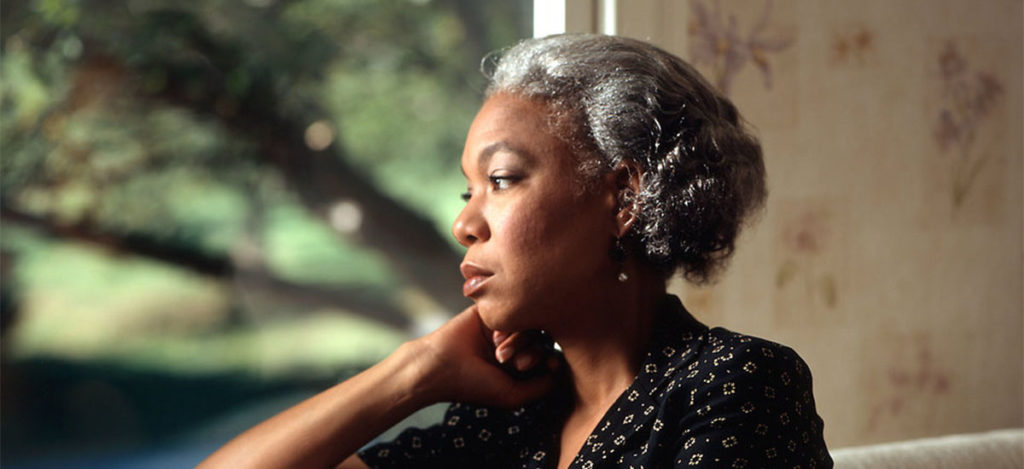
What might happen if we ignore our grief during quarantine?
By Amber Butts
Content Note: This essay mentions death, suicide and state violence.
I come from a whistling family. We like sound. The way tones release emotion, scent, possibility. The way whistling can shape and bend bone, can spellcast, can river.
I sat at the feet of the women in my family often, feeling lucky and at home in their voices, their stories, the way they moved their hands. I found myself in conversations I never understood and they let me. That was enough. I never needed a translation.
And eventually I learned that food, like bodies and postures and empty spaces and people who are no longer here, can signal different things: excitement. loss. change. regret. fear. lust. loneliness. conflict. abuse. anemia. hurt. goodbyes. That it can hold the notes of what isn’t said, just as much as it can say what’s already there.
My grandmama’s food said, “I’m lonely and I’m doing my best to feed you. Here, listen. Let this food cover your belly, let it watch over us, let it be enough.”
I smell this food now when the bird outside whistles at five in the morning, a blue, blaring, jagged alarm. I rise, saying to myself over and over and over that today is the day I will make what she made. Today is the day we will smell alike. I will be ready.
And of course, I’m not. That’s not how grief works. You don’t just become ready because you say you are. You cannot trick hearts like that.
The day edges on. Repeats. Cracks open. Falls apart. Once I’ve thrown away all the ingredients, I try to ignore my grief. But it’s still there, underneath and on top of everything.
So I set an alarm for the next week. Before I know it, I’m holding the alarm in front of me, and it’s loud and white and all consuming. I imagine a camera inside it, with a person on the other end laughing at me. Because isn’t that what this world has taught folks to do, laugh at and silence each other’s grief spills?
On the same day that I give myself the talk about how unsustainable all this is, I have a dream of my grandmama calling my name. There are fireworks and screaming children nearby. My palm is cut open and shivering.
**
RELATED: On Dumplings and Death – A Thanksgiving Remembrance
On Tuesday I make her food: salmon croquettes (sans the can), mashed potatoes and broccoli. I slice the lemon, steady myself, set out the plates, and sit down. I wait until the food is almost cold. I let the fish bones travel down my throat instead of picking them out. I let the tequila numb my heart.
**
There is a glass candy bowl on my grandmother’s coffee table filled with bullets. I hold each one in my mouth. The taste of tin, parchment paper, soggy rice and warm memories shoots out. One of the table legs is loose and gleaming and every time I touch a photo of all the people we’ve lost, it sings. In 1949, my grandmother went to a rally and swore she saw her son who wasn’t born yet. When she told her husband, he slapped her full force and she swallowed the vision and blood down as quick as she could. Whenever she gets near fresh water, she feels the sting screaming, “Help the boy. Quick, before he falls.”
The photo album on my grandmother’s living room table houses old notes from her daughter’s piano lessons. She was going to be a singer. I gaze at them all, afraid. My cousin chuckles out a bright brassy blanket and we freeze. Someone calls us and we rush out, a fuschia blur. The air is ripe for rain.
**
I am constantly rubbing my hands. Left palm over the Black hand side, right palm over the Black hand side, thumbs hugging. Repeat. These hands surface each other. Relieve tension. Get ashy. Beg for moisture.
I have big, strong hands ready to remake things. My grandmama’s hands. I especially loved placing mine over hers, hers over mine. How we disappeared into each other like that.
After she died, I touched her hands just once, tracing her blue veins, coaxing them to be as strong as the ocean. At one point, I thought she was growing like a plant. That breath would come out of her again.
One thing no one tells you and you will forget again, in the space between watching other folks die: Bodies become taut after death. The hair and fingers on them appear to grow, but really everything is shrinking. Your heart. The prayers for recovery. The brain specialist’s voice after he told us her brain hemorrhaged after the stroke. How my aunt’s hands instinctively shot to the car speaker ten seconds after he shared the statistics of her making it. Even the road shrinks ahead as y’all race to the hospital.
**
RELATED: I wish Black folks could mourn in our own little bubble
There’s an aching fury of grief that I have felt every day since my grandmama died. That crawling anger is made bigger, louder, sharper, more emphatic as I quarantine away from family. As my world brims with loss. As more family members die in ways that don’t feel possible. As we cancel, postpone or digitize funeral services. As loved ones give birth in hospitals without familiar faces. As best friends receive terminal news. As we move towards a world without hugs.
My hands have started to peel and tingle and bleed again. Yesterday, I found myself digging a line in my hand, one not unlike the cut from my dream. I want to nourish these fingers. I want them to stretch and be big and say things. I want them to feel again.
On the days when getting out of bed is a mountain, when the restroom feels impossible miles away, when grief becomes a constant wail, when home is not a sanctuary, I remind myself: my hands fit inside hands before. They spelled and spread out a world. They believed. They settled on cracked feet. They massaged and listened and bore witness.
What will happen when there are no more feet to rub? What will happen as we continue to pretend not to notice our calluses?
Amber Butts is a writer, organizer and educator who believes that Black folk are already whole. Her work centers Black children, Black mamas and Black elders. It asks big and small questions about how we move towards actualizing spaces that center tenderness, nuance and joy.
This piece is part of Breakthrough’s program By & For; An initiative to amplify the lived experiences of creative girls and gender non-conforming youth of color in authentic, nuanced, and respectful ways, and provide them with platforms to share their own creative work, on their own terms. Support By & For here.
